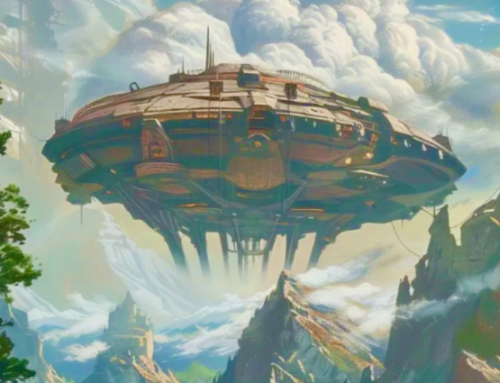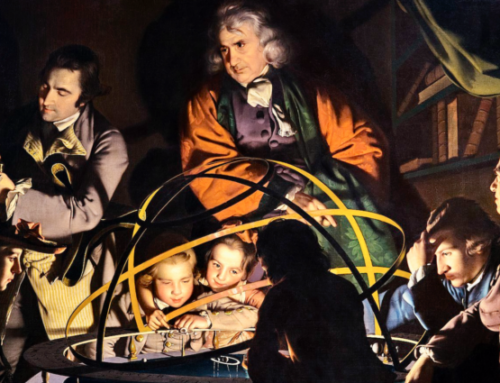According to Friedrich-Georg Jünger, modern man’s veneration of technology reveals his distant kinship to the Titans of myth. This ‘titanic’ impulse to dominate and consume expresses itself through our technology-driven industrial economy, which now determines every aspect of life from the air we breathe to the food we eat.
 Ongoing debates concerning the growing power of big tech, the implications of advancing artificial intelligence, and the health of the environment have made it an opportune time to revisit works that critically examine our relationship to technology. One such work that we might consider is the German essayist Friedrich-Georg Jünger’s The Perfection of Technology (orig. Die Perfektion der Technik).
Ongoing debates concerning the growing power of big tech, the implications of advancing artificial intelligence, and the health of the environment have made it an opportune time to revisit works that critically examine our relationship to technology. One such work that we might consider is the German essayist Friedrich-Georg Jünger’s The Perfection of Technology (orig. Die Perfektion der Technik).
Written amid the unprecedented destruction of the Second World War, in The Perfection of Technology (or Technik, as I shall refer to it) Jünger drew on his enviable knowledge of the Western literary and philosophical traditions to explore the malefic effects of technological progress on the spiritual values of modern man. Although more than 70 years have passed since the turbulent era in which Technik was conceived, Jünger’s cautionary message is perhaps more relevant in our own time—where the protean forces of technology have long since become ubiquitous—than ever before. Indeed, some would assert that many of Jünger’s prescient insights have yet to be refuted.
One of the principal themes of Jünger, a poet with a strong sense for metaphor, is that modern man’s veneration of technology reveals his distant kinship to the Titans of myth. In the Western tradition, the Titans rebelled against the Olympian Gods and sought to usurp their power for themselves. Most famous of all was Prometheus, who stole the primordial flame and thereby came to symbolize the dangers of human striving and overreach. “All technology is of titanic mold,” Jünger writes, “and man the maker is always of the race of the titans. From his titanic kinship stems his love for the enormous, the gigantic, the colossal; his delight in towering works that impress by their quantity and mass, the vastness of their piled up matter.”
For Jünger, this ‘titanic’ impulse expresses itself through our technology-driven industrial economy, which has grown from its humble origins in western Europe to cover the whole earth, determining every aspect of life from the air we breathe to the food we eat. Whereas a healthy, humane economy would take care to preserve the underlying substance with which it works, whether in terms of manpower or natural resources, the modern “global economy” seeks to maximize production and consumption above all else. Although couched in the language of freedom—of free enterprise and free markets—it often seems that persons exist to serve the economy and keep it functioning rather than the other way around.
While we have convinced ourselves that such continuous economic growth is justified by the acquisition of ever greater amounts of “riches,” Jünger argues that true riches do not consist merely in material acquisitions, but in the authentic “being” that animates all genuine civilizations: “Unfailingly, the mark of riches is that they lavish abundance like the Nile. Riches are the regal nature in man which goes through him like veins of gold.” While this distinction was known to our forebears, today it has been buried by those who equate riches and economic having. The more man devotes himself to the so-called “dismal science,” however, the more he cuts himself off from these intangible, spiritual riches that cannot be neatly quantified or piled up.
Intuitively tied to the economic factor is the modern administrative state, which has likewise grown exponentially in terms of size and influence. Gone are the days when the state was defined by the character of its people, their culture and traditions. “The state itself is now conceived by technology as an organization which must be brought to perfection,” Jünger writes. “The technician asserts that the State can properly fulfill its tasks only when it becomes organized on a completely technical basis, when the idea of the state and its purpose are organized into a centralized functionalism, an all-embracing machine which nothing escapes.”
Under the direction of the technocrat, law becomes subservient to the needs of technological organization at the expense of justice. A technocracy favors the generation of flexible statutes and executive decrees over and against the formalistic, traditional type of jurisprudence that tolerates departure from the rule only sparingly. In Jünger’s view, this co-opting of the law is readily apparent in the sustained attacks on personal freedoms and property rights, which place a heavy burden on the technocrat’s dynamic planning because of the sense of permanence they bestow:
The technician fights property, not on theoretical grounds, as does the social agitator; he actually transforms it by subjecting it to his all powerful organization which disposes of it freely from rational points of view. Foremost he attacks the right to land; for landed property he feels that loathing which the dynamic mind has for all that is immobile.
This organization justifies itself on the basis of providing a greater security, as one of the necessary evils of modern life. In practice, however, it tears at the cultural fabric until all that was once stable and at rest is thrown into a dizzying state of motion. The technically organized society thus becomes a “mass” society in which no one can lead an independent existence, even if one wanted to.
To compensate for the loss of the organic, unorganized aspects of life that are uprooted by the technical transformation of the state, Jünger observes that various ideologies begin to proliferate. While such belief-systems purport to satisfy the human yearning for the transcendent with their visions of a futuristic utopia, in practice they affirm the extent to which modern man is being reduced to a kind of mass-product, as all ideologies presuppose a mechanical uniformity in the minds of their adherents. At the time Jünger was writing, it was primarily Nazism and Communism, both of which had sought to combine the potential of technology with a Promethean will to power, that developed in this manner. It would be naïve, however, to think that contemporary liberal democracy, which has embraced technology in the interest of perpetuating what has been dubbed a “soft” totalitarianism, is somehow free of the same ideological tendencies.
Most telling of all in this regard is the reorganization of schools and universities. In place of the classical and medieval ideal, which emphasized the enkyklios paideia, or “rounded education,” today educational institutions resemble technical training centers, where “factual” knowledge of a purely empirical character has prevailed over an integrated form of knowledge rooted in the formation of shared culture and wisdom. As Jünger argues, modern man takes great pride in this accumulation of merely factual knowledge, but such knowledge can only ever amount to a mare tenebrosum, or “dark sea,” for a boundless knowledge is a knowledge that has become devoid of character and form. “If to the human mind all things are equally worth knowing,” Jünger writes, “then knowledge loses all value.”
Despite our best efforts, today we find ourselves overwhelmed by the “rising tide” of these facts. Although technological innovations such as the internet and smartphones have quite literally placed the “world at our fingertips,” allowing us to carry around an almost divine store of knowledge in our back pockets, it often seems that we know less than ever before. In Jünger’s view, “it would not be surprising if we were to become as weary from this vastness of knowledge as from a crushing weight which burdens our back.”
A further domain where our titanic nature reveals itself is modern science. In place of the “great concepts” that stood at the beginning of science, Jünger observes that today we find the hyper-specialization characteristic of modern laboratories and research centers—that “nakedly utilitarian cleverness” that is animated by the desire to penetrate the “dark jungles of phenomena” and torture nature until she divulges her secrets. While this modern, ‘Promethean’ form of science has allowed us to perform many miraculous feats, from space travel to the curing of myriad diseases, it has also convinced us that we can shape reality in accordance with our will. In its most uncanny applications, modern science is preparing the way for the triumph of biotechnics and transhumanism, which champion the merging of man with machine in an effort to surpass our inherent limitations.
Ironically, even as modern science devises the means by which we might overcome our own humanity, it falls prey to an all-too-human folly, for it has also created instruments of immense destructive potential, such as nuclear weapons, that threaten to undo life on earth as we know it. As a veteran of the First World War, Jünger was intimately familiar with the destructive capabilities of modern weaponry, which had degraded combat from a contest of man against man to one of man against machine. Consider the following passage, where Jünger describes his experience at Flanders in 1917:
I confess that, in the first battle of Flanders, I was shocked, not so much by the spectacle of death and destruction, as by the man-made transformations of whole landscapes. The artillery barrages which had hailed down for weeks had turned this theater of war into a sort of moonscape covered with craters. Its volcanic character was unmistakable. It would have been hard to find a single object that had not been most violently mangled. Fantastically twisted and disemboweled machinery was scattered about in fragments—airplanes, motor vehicles, wagons, field kitchens—their skeletons in grotesque piles. This deformation of technical apparatus—and of the human bodies involved in it—was the reverse side of a level of technological development in which a vast amount of elemental energy had been fettered by mechanical apparatus. There are many to whom such destruction seems senseless and inexplicable because they do not understand the relation which this represents.
For Jünger, it is amid the fog of war that technology proves itself a true Faustian bargain. Although modern man earnestly believes that technology is his faithful servant, the chaos of combat creates an opportunity for the elemental forces that we have channeled within our technology to break loose from their steel prisons. Once free, they turn on man and exact their vengeance.
Here again we find the traces of the ancient myths, for while Prometheus’ gift of fire allowed humanity to create civilization, it also gave us the means of waging war with one another, thus hastening the decline from the golden age to the present age of iron. In this sense, Jünger suggests that our era of “increasingly perfect technology” may be likened to the myth of Saturn, for just as Saturn devoured his own children, modern civilization devours its own security through its dependence on the very technology that unmoors its foundations.
Why, Jünger asks, does the “craving for security” that pervades the modern consciousness grow in step with technological progress? The answer must be that technology’s advocates have become cognizant of the inherent dangers of the forces they have set in motion. In Jünger’s words, “Modern man wakes up to the fact that the elemental forces he has enslaved in his machinery are turning against him with ever growing, viciously destructive force.”
To prevent our fears of imminent self-destruction from becoming reality, Jünger encourages us to learn from the example of the ancient Greeks, the “familiars of beauty’s golden rule.” It was they who, more than any other race that has walked the earth before or after, overcame the temptation to align themselves with the Titans by following the example of the Olympian Zeus, who symbolizes the latent, regal nature hidden deep within man’s being. “The majesty of Zeus is fullness of being, quiescent strength,” Jünger writes. By way of contrast, the strength of Prometheus resides in “rebellious upheaval, in the urge to cast Zeus from his golden throne, to drive out all gods, and to make himself master of the world.”
Through such symbolism, Jünger suggests that the Western imagination is ever pulled in two disparate directions. On the one hand, it is tempted to utilize technology in its attempts to master the world and satisfy its lust for power. On the other, it seeks the balance and harmony that can only be found on the ‘peaks of Olympus,’ where the gods dwell. That we have tended toward one extreme over the other goes without saying. The modern world has long since become, as Jünger well recognized, the “workshop of the Titans.” So long as a few among us still commit ourselves to the pursuit of the good, true, and beautiful, however, we may yet overcome these colossal forces.
The Imaginative Conservative applies the principle of appreciation to the discussion of culture and politics—we approach dialogue with magnanimity rather than with mere civility. Will you help us remain a refreshing oasis in the increasingly contentious arena of modern discourse? Please consider donating now.
The featured image is “Prometheus Brings Fire to Mankind” (1790 or c. 1817) by Heinrich Füger (1751–1818) and is in the public domain, courtesy of Wikimedia Commons.







A very insightful essay, Mr. Pheneger. Thank you. Your last sentence seemed misplaced. Using the word “ overcome” struck me as a bit unsettling. Humbly, I cannot arrive at a better word, and I appreciate your intent. To me, that word would indicate that the battle is to be fought externally rather within the realm of our own minds and souls.
I appreciate the comment. I would also note that “Overcome” has undeniably Promethean overtones. At the same time, I too was unable to come up with a better word. Perhaps this suggests that our Promethean nature is something that will always be with us in some shape or form? In any case, I am glad that you realized the battle is an interior one. In fact, Junger’s work is completely devoid of any recommendations for external action.